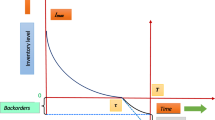Abstract
The main purpose of this paper wants to investigate the effect of trade credit policy with limited storage capacity within the economic order quantity (EOQ) framework. Goyal is frequently cited when the inventory systems under conditions of permissible delay in payments are discussed. But Goyal assumed that the retailer’s storage capacity is unlimited. This assumption is debatable. So, we want to extend Goyal’s model to the case that the retailer’s storage capacity is limited. Then, two theorems present solution procedures to locate the optimal cycle times of the annual total relevant cost function. In essence, the inventory model discussed in this paper generalizes that of Goyal. Finally, numerical examples are given to illustrate all theorems obtained in this paper.
Similar content being viewed by others
References
Aggarwal, S.P., Jaggi, C.K., “Ordering policies of deteriorating items under permissible delay in payments”, Journal of the Operational Research Society, 46 (1995) 658–662.
Arcelus, F.J., Shah, N.H., Srinivasan, G., “Retailer’s pricing, credit and inventory policies for deteriorating items in response to temporary price/credit incentives”, International Journal of Production Economics, 81–82 (2003) 153–162.
Berkherouf, L., “A deterministic order level inventory model for deteriorating items with two storage facilities”, International Journal of Production Economics, 48 (1997) 167–175.
Bhunia, A.K., Maiti, M., “A two-warehouse inventory model for deteriorating items with a linear trend in demand and shortages”, Journal of the Operational Research Society, 49 (1998) 187–292.
Chand, S., Ward, J., “A note on economic order quantity under conditions of permissible delay in payments”, Journal of Operational Research Society, 38 (1987) 83–84.
Chang, H.J., Dye, C.Y., “An inventory model for deteriorating items with partial backlogging and permissible delay in payments”, International Journal of Systems Science 32 (2001) 345–352.
Chang, H.J., Hung, C.H., Dye, C.Y., “An inventory model for deteriorating items with linear trend demand under the condition of permissible delay in payments”, Production Planning and Control, 12 (2001) 274–282.
Chen, M.S., Chuang, C.C., “An analysis of light buyer’s economic order model under trade credit”, Asia-Pacific Journal of Operational Research, 16 (1999) 23–34.
Chu, P., Chung, K.J., Lan, S.P., “Economic order quantity of deteriorating items under permissible delay in payments”, Computers and Operations Research, 25 (1998) 817–824.
Chung, K.J., “A theorem on the determination of economic order quantity under conditions of permissible delay in payments”, Computers and Operations Research, 25 (1998a) 49–52.
Chung, K.J., “Economic order quantity model when delay in payments is permissible”, Journal of Information & Optimization Sciences, 19 (1998b) 411–416.
Chung, K.J., “The inventory replenishment policy for deteriorating items under permissible delay in payments”, Opsearch, 37 (2000) 267–281.
Chung, K.J., Chang, S.L., Yang, W.D., “The optimal cycle time for exponentially deteriorating products under trade credit financing”, The Engineering Economist, 46 (2001) 232–242.
Goswami, A., Chaudhuri, K.S., “An economic order quantity model for items with two levels of storage for a linear trend in demand”, Journal of the Operational Research Society, 43 (1997) 157–167.
Goyal, S.K., “Economic order quantity under conditions of permissible delay in payments”, Journal of the Operational Research Society, 36 (1985) 35–38.
Hwang, H., Shinn, S.W., “Retailer’s pricing and lot sizing policy for exponentially deteriorating products under the condition of permissible delay in payments”, Computers and Operations Research, 24 (1997) 539–547.
Jamal, A.M.M., Sarker, B.R., Wang, S., “An ordering policy for deteriorating items with allowable shortages and permissible delay in payment”, Journal of the Operational Research Society, 48 (1997) 826–833.
Jamal, A.M.M., Sarker, B.R., Wang, S., “Optimal payment time for a retailer under permitted delay of payment by the wholesaler”, International Journal of Production Economics, 66 (2000) 59–66.
Kim, J.S., Hwang, H., Shinn, S.W., “An optimal credit policy to increase wholesaler’s profits with price dependent demand functions”, Production Planning and Control, 6 (1995) 45–50.
Liao, H.C., Tsai, C.H., Su, C.T., “An inventory model with deteriorating items under inflation when a delay in payment is permissible”, International Journal of Production Economics, 63 (2000) 207–214.
Pakkala, T.P.M., Achary, K.K., “A deterministic inventory model for deteriorating items with two warehouses and finite replenishment rate”, European Journal of Operational Research, 57 (1992) 71–76.
Sarker, B.R., Jamal, A.M.M., Wang, S., “Supply chain model for perishable products under inflation and permissible delay in payment”, Computers and Operations Research, 27 (2000) 59–75.
Sarker, B.R., Jamal, A.M.M., Wang, S., “Optimal payment time under permissible delay in payment for products with deterioration”, Production Planning and Control, 11 (2001) 380–390.
Sarma, K.V.S., “A deterministic order level inventory model for deteriorating items with two storage facilities”, European Journal of Operational Research, 29 (1980)70–73.
Shah, N.H., “A lot-size model for exponentially decaying inventory when delay in payments is permissible”, Cahiers du CERO, 35 (1993) 115–123.
Shawky, A.I., Abou-El-Ata, M.O., “Constrained production lot-size model with trade-credit policy: ‘a comparison geometric programming approach via Lagrange’ “, Production Planning and Control, 12 (2001) 654–659.
Shinn, S.W., Hwang, H., “Optimal pricing and ordering policies for retailers under order-size-dependent delay in payments”, Computers and Operations Research, 30 (2003) 35–50.
Teng, J.T., “On the economic order quantity under conditions of permissible delay in payments”, Journal of the Operational Research Soriety, 53 (2002) 915–918.
Author information
Authors and Affiliations
Rights and permissions
About this article
Cite this article
Chung, KJ., Huang, YF. Optimal replenishment policies for EOQ inventory model with limited storage capacity under permissible delay in payments. OPSEARCH 41, 16–34 (2004). https://doi.org/10.1007/BF03398830
Published:
Issue Date:
DOI: https://doi.org/10.1007/BF03398830




